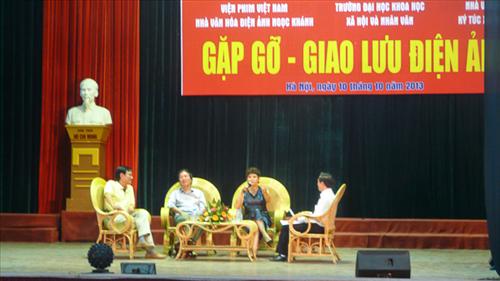The event aimed to introduce and honor the significant contributions of generations of artists to the national film industry, while also serving as a bridge to bring young audiences and artists closer together. Guests at the event included People's Artist director Dang Nhat Minh, Meritorious Artist director Huu Muoi, and Meritorious Artist Minh Chau. These are all talented artists who have made significant contributions to Vietnamese cinema.
Before the Q&A session, the film "Don't Burn" by director Dang Nhat Minh was screened, igniting the emotions of the students. Deeply moved by the young audience's enthusiastic response to his film, director Dang Nhat Minh stated: "This is the most priceless and precious gift in my filmmaking career. The affection of the young audience makes me feel more confident about the future of Vietnamese cinema."
Through his professional story shared with students, the veteran filmmaker revealed that his entry into filmmaking was entirely coincidental. Born into an intellectual family in Hanoi, with his father being the renowned professor Dang Van Ngu, and his siblings all pursuing careers in medicine, he was assigned to study to become a Russian interpreter. This work allowed him early access to materials from various film industries around the world. From interpreting for Soviet films screened in Vietnam, he had the opportunity to engage with Soviet and world cinema, accumulating his initial knowledge of filmmaking. Despite having no formal training, thanks to his talent, passion, and love for the cultural and humanistic values of the nation, Dang Nhat Minh quickly became a leading director in Vietnamese cinema with a series of films that won numerous major awards both domestically and internationally, such as: "When Will October Come?", "The Guava Season", "The Girl on the River", "Hanoi in the Winter of 1946", "Nostalgia for the Countryside", "Returning Home", "Don't Burn"... Director Dang Nhat Minh's films are highly regarded for recreating life through cinematic language in a way that is ordinary, subtle, and captivating, rich in poetic qualities and philosophical insights. His characters often reveal the hidden aspects of their thoughts and feelings deep within their souls and possess a strong desire to live.
In particular, the film "When Will October Come?", produced in 1981, is considered a classic of Vietnamese cinema, winning the Golden Lotus Award at the 7th Vietnam Film Festival in 1985, the Special Prize at the Asia-Pacific International Film Festival in 1989, a Certificate of Merit from the Committee for the Protection of Peace at the Moscow International Film Festival in 1985, the Special Jury Prize at the Hawaii International Film Festival in 1985, and being one of the eighteen best Asian films of all time as selected by CNN. However, few people know that director Dang Nhat Minh filmed the movie under very difficult circumstances with an old film camera, and had to reshoot scenes many times because the camera ruined many shots.
When asked by a student, "In your opinion, what is the secret to making a successful film?", the director humorously replied, "It's about not thinking about awards when making a film." The director shared that when making a film, he only thinks about how to best convey the content and ideas of the film: "When making a film, I'm in a trance-like state, always thinking about how to achieve the best effect, sometimes even forgetting about eating and drinking…" From a professional perspective, director Dang Nhat Minh believes that the success of his films is largely due to his luck in finding the right actors for the roles: "If it weren't for artist Minh Chau, no one could have portrayed the character Nguyet in 'The Girl on the River' better, or if it weren't for Huu Muoi, no one could have brought such success to the character of teacher Khang in 'When Will October Come?'"
Sharing her passion for acting, Meritorious Artist Minh Châu – a talented actress known as "the woman with expressive eyes" – shared: "Just liking it isn't enough. To succeed in any field, especially in acting, you need genuine passion, a life-or-death commitment to the profession, and a dedication to each role." Having achieved fame with many roles portraying complex characters, and winning Best Actress awards for her roles as Nguyệt in "The Girl on the River" and "The Woman Who Plays with Sand," Meritorious Artist Minh Châu is also remembered by the public for many popular television series in recent years such as: "The Heir," "Nguyễn Thị Minh Khai," "The Provincial Party Secretary," etc. In the eyes of her fans, Minh Châu not only possesses talent but also a timeless cinematic beauty and always wants to challenge herself with difficult roles, even after reaching the pinnacle of her career.
She said that there were times when the living conditions of an artist were difficult, and she once decided to temporarily stop acting, not making films for three years to find another job. “But then I became addicted to acting like I was addicted to heroin; I couldn’t leave it, so I returned to film with an even more intense and burning passion,” Minh Châu recounted about the ups and downs of her career.
The third guest – Meritorious Artist Huu Muoi – Deputy Head of the Directing Department, Vietnam National University of Theatre and Film – maintains his passion for cinema in a different way. He was once famous for his roles as Teacher Thu (in the film "Lang Vu Dai Ngay Ay") and Teacher Khang (in the film "Bao Gio Cho Den Thang Muoi" – Best Actor Award at the 7th Vietnam Film Festival - 1985). After achieving success as an actor, Meritorious Artist Huu Muoi chose a different path to have a longer-term connection with cinema: becoming a director. Most recently, Director Huu Muoi achieved success as the director of the film "Mui Co Chay" – winning the Silver Lotus Award at the 17th Vietnam Film Festival (December 2011), the Golden Kite Award from the Vietnam Film Association (March 2012), and a commendation for an outstanding film on the theme of war from the Ministry of National Defense.
When asked, "Is it a common path for excellent male actors to become directors after starting as actors?", he replied: Acting is interesting and hard to give up for those who have chosen it. But personally, after a period of acting and learning from many directors, he wanted to tell his own life stories and convey his cherished life philosophies. Therefore, he switched to studying directing and began this new yet fascinating career at an age when he was no longer young. That's how he maintains his love for his passion for cinema – not necessarily the path of most actors, but a suitable choice for him personally.
Besides sharing stories about their lives and careers, the students posed "hot" questions to the artists about the current challenges facing Vietnamese cinema, the changing tastes of audiences that have led many filmmakers astray, and the differences between filmmaking styles of the past and present…
Meritorious Artist Minh Châu shared her thoughts: her generation of artists and her contemporaries only knew how to act in films, feeling that it was the meaning of their lives, not being swayed by too many temptations of money. Young people today have more career choices, but not everyone dares to make the sacrifice to dedicate their entire lives to pursuing a profession they are passionate about.
Director Dang Nhat Minh shared his perspective: "For me, there are only two ways to make films: one is to make them for art, and the other is to make them for business." Currently, many filmmakers prioritize profit, thus maximizing public appeal and producing films with low moral values. This is extremely dangerous, as it corrupts an entire generation of viewers, leaving them unsure of what to believe in and what values to cherish in life.
To change this situation, the renowned director believes that it entirely depends on young audiences, those who possess knowledge, understanding, and the ability to appreciate beauty. Students from the University of Social Sciences and Humanities will be the future audiences of Vietnamese cinema – those who will say no to nonsensical films and facile filmmaking methods – forcing filmmakers to be more serious and rigorous in their creative work.
The exchange session ended with many students feeling regretful because many questions remained unanswered by the artists. However, it is certain that their love for their profession, their dedication to their roles, and the way the artists overcame difficulties to pursue their passion for filmmaking will be invaluable lessons for these young people as they journey through life.




